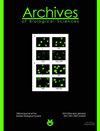The protective effect of alfalfa (Medicago sativa L.) seed extract containing polysaccharides on human keratinocytes and fibroblasts
IF 0.8
4区 生物学
Q4 BIOLOGY
引用次数: 0
Abstract
To protect the body against environmental threats, cosmetics can play important antiinflammatory and anti-aging roles. Many researchers have developed cosmetic ingredients using natural plant extracts or the active compounds of such extracts. In this study, we assessed the ability of extracts from the seeds of alfalfa (Medicago sativa L.) to affect skin cells. In a keratinocyte-derived cell line (HaCaT cells), alfalfa polysaccharide extract (APE) treatment triggered cornified envelope formation and increased the gene expression levels of filaggrin and involucrin, suggesting that APE increased epidermal cell differentiation. In addition, APE dramatically increased the mRNA and protein levels of claudin1, suggesting that it enhances tight junction formation. Finally, APE exerted antiinflammatory effects in keratinocytes by decreasing the LPS-induced production of proinflammatory cytokines. In primary normal human dermal fibroblasts (NHDF), APE increased procollagen synthesis and decreased elastase activity and metalloproteinase-1 (MMP) secretion. APE also showed superoxide dismutase (SOD)-like activity in a cell-free system, resulting in antioxidant effects. Finally, we found that the polysaccharides from alfalfa seeds used in our experiments consist mainly of galactose and mannose. Based on our findings, we conclude that APE may have potent skinprotective and skin-improving effects and could be developed as an important ingredient in cosmetics and medicines.含多糖紫花苜蓿种子提取物对人角质形成细胞和成纤维细胞的保护作用
为了保护身体免受环境威胁,化妆品可以发挥重要的抗炎和抗衰老作用。许多研究人员使用天然植物提取物或这种提取物的活性化合物开发化妆品成分。在这项研究中,我们评估了紫花苜蓿种子提取物对皮肤细胞的影响能力。在角化细胞衍生细胞系(HaCaT细胞)中,苜蓿多糖提取物(APE)处理引发了角质包膜的形成,并增加了聚丝蛋白和天花素的基因表达水平,表明APE促进了表皮细胞的分化。此外,APE显著提高了claudin1的mRNA和蛋白水平,表明APE促进了紧密连接的形成。最后,APE通过降低lps诱导的促炎细胞因子的产生,在角质形成细胞中发挥抗炎作用。在原代正常人真皮成纤维细胞(NHDF)中,APE增加前胶原合成,降低弹性酶活性和金属蛋白酶-1 (MMP)分泌。在无细胞系统中,APE还显示出超氧化物歧化酶(SOD)样活性,从而产生抗氧化作用。最后,我们发现实验中所用的苜蓿种子多糖主要由半乳糖和甘露糖组成。基于我们的研究结果,我们得出结论,APE可能具有有效的皮肤保护和改善作用,可以作为化妆品和药物的重要成分开发。
本文章由计算机程序翻译,如有差异,请以英文原文为准。
求助全文
约1分钟内获得全文
求助全文
来源期刊
CiteScore
1.40
自引率
0.00%
发文量
25
审稿时长
3-8 weeks
期刊介绍:
The Archives of Biological Sciences is a multidisciplinary journal that covers original research in a wide range of subjects in life science, including biology, ecology, human biology and biomedical research.
The Archives of Biological Sciences features articles in genetics, botany and zoology (including higher and lower terrestrial and aquatic plants and animals, prokaryote biology, algology, mycology, entomology, etc.); biological systematics; evolution; biochemistry, molecular and cell biology, including all aspects of normal cell functioning, from embryonic to differentiated tissues and in different pathological states; physiology, including chronobiology, thermal biology, cryobiology; radiobiology; neurobiology; immunology, including human immunology; human biology, including the biological basis of specific human pathologies and disease management.

 求助内容:
求助内容: 应助结果提醒方式:
应助结果提醒方式:


